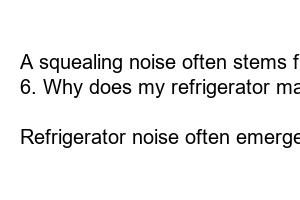냉장고 소음 원인
Title: Buzz, Whir, and Clank: Unmasking the Causes of Refrigerator Noise
Subheadings:
1. Introduction: The Symphony of Refrigerator Noise
2. Misaligned or Worn-Out Fan Blades
3. The Peculiar Case of Defective Motors
4. Compressor Conundrum: The Culprit Behind Rattling Sounds
5. The Cold Culprits: Faulty Defrost Timers and Heaters
6. The Noisy Art of Water Valve Malfunctions
7. Troubleshooting Refrigerator Noises: Frequently Asked Questions
Introduction: The Symphony of Refrigerator Noise
We’ve all encountered that unwelcome moment when our refrigerator’s peaceful hum transforms into an irritating noise, disrupting the tranquility of our homes. Fear not, for today’s blog post aims to uncover the common causes behind these unruly sounds and provide you with solutions to restore your appliance to its serene state.
Misaligned or Worn-Out Fan Blades
One of the leading causes of refrigerator noise is misaligned or worn-out fan blades. Fan blades often become misaligned due to regular wear and tear, causing them to scrape against other components. A quick inspection and realignment or replacement of the blades can alleviate this issue, restoring the silence in your kitchen domain.
The Peculiar Case of Defective Motors
Defective motors can also contribute to that annoying buzzing or whirring sound emanating from your refrigerator. Motors responsible for circulating coolant or running the condenser may become noisy over time. Replacing or repairing these faulty motors should put an end to their incessant noise.
Compressor Conundrum: The Culprit Behind Rattling Sounds
Rattling sounds that put you on edge can often be attributed to a faulty compressor. Loose mounting springs or rubber feet can disrupt the smooth operation of the compressor, causing it to create unnecessary noise. Adjusting or replacing these mounting components can effectively eliminate the rattling.
The Cold Culprits: Faulty Defrost Timers and Heaters
If you notice a persistent clicking or hissing sound, it may indicate a malfunctioning defrost timer or heater. These components, responsible for preventing frost accumulation, may deteriorate or become faulty, leading to disruptions in their functioning. Replacing the defective parts will minimize or eliminate the noise.
The Noisy Art of Water Valve Malfunctions
Water valve malfunctions can introduce an unwanted element of noise to your refrigerator. A faulty water inlet valve or clogged water line can result in vibrating or humming sounds. Inspecting the water valve and ensuring the proper flow of water can resolve the issue and restore the tranquility of your kitchen.
Troubleshooting Refrigerator Noises: Frequently Asked Questions
1. Why is my refrigerator making a clicking noise?
A clicking noise often signifies a defective thermostat or compressor overload relay. Contacting a professional technician for replacement is recommended.
2. Can a refrigerator make a knocking sound?
Yes, a knocking sound can be a result of refrigerant flow issues or an uneven surface beneath the refrigerator. Ensuring a level placement or contacting a technician is advisable.
3. What causes a refrigerator to make a loud humming noise?
A loud humming noise may indicate a malfunctioning condenser fan motor or a worn-out compressor. Timely repair or replacement is necessary to restore peace and quiet.
4. How do I fix a noisy refrigerator door?
Loose hinges or worn-out door gaskets can cause a noisy refrigerator door. Tightening the hinges or replacing the gaskets can resolve the issue.
5. What should I do if my refrigerator is making a squealing noise?
A squealing noise often stems from a malfunctioning evaporator fan motor. Replacing the motor is necessary to eliminate the noise.
6. Why does my refrigerator make gurgling noises?
Gurgling sounds are common when refrigerant flows through the system. These noises are usually harmless and do not call for immediate action.
Summary:
Refrigerator noise often emerges from various technical hiccups, including misaligned fan blades, defective motors, malfunctioning compressors, faulty defrost timers, and water valve malfunctions. By identifying the specific cause and taking appropriate measures, such as realigning or replacing components, you can restore the peace and quiet in your kitchen, enabling you to enjoy the refreshing coolness without any troublesome noise.

